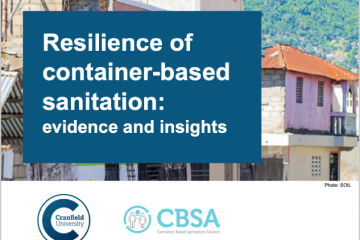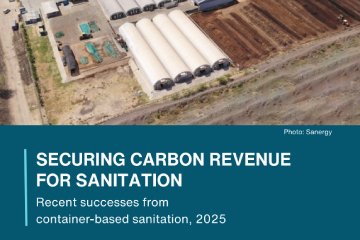Originally published on the Stone Family Foundation website, this blog looks back on the Alliance’s journey to date during its first strategic phase.
The CBSA was formed in November of 2016 to transform urban sanitation provision by promoting CBS as solution in dense urban areas where demand for sanitation services is high and on-site sanitation and sewerage are not feasible or cost-effective.
It is a coalition of CBS practitioners with extensive experience in developing and providing CBS services, and a shared vision of a world where access to dignified, safe and affordable sanitation is no longer out of reach for families and communities in low-income, urban areas.
The six founder members of the CBSA include Clean Team (Ghana), Loowatt (Madagascar), Sanergy (Kenya), Sanivation (Kenya), SOIL (Haiti) and X-Runner (Peru).
We set out with the aim to formalise CBS as a widely accepted and endorsed approach among municipalities and regulators, help sanitation services to reach scale, and achieve sustainable impact in urban areas around the world.
As we begin a new decade and plan the next stage of action for the Alliance, we’ve been taking some time to reflect on our progress and achievements so far, and plan for how to build on them.
Enhanced legitimacy for the CBS approach
A significant development in the work of the CBSA and its members came from the WHO/UNICEF Joint Monitoring Programme recognising container-based sanitation as ‘improved’ sanitation last year. This classification endorses it as a safely managed sanitation service under the Sustainable Development Goals and provides legitimacy at the highest level.
The World Bank also published a study on the potential of CBS, Evaluating the potential of Container Based Sanitation, which included extensive consultation with the CBSA and its members. The report assesses the legal and policy environment as well as the financial performance and quality of CBS services. It lays out important emerging lessons for governments and external funders to enable scale up. Critically, it concludes CBS approaches should be considered as part of a menu of citywide inclusive sanitation options.
These achievements are testament to the value of the Alliance, and its ability to provide insights and impact the sector.
Promoting knowledge and learning in the sector
CBSA members have collaborated on substantial endeavours, including the development of a common digital platform (VeriSan); a customer and operations management tool which supports efficient CBS delivery. The data is also intended to facilitate impact reporting, advocacy and funding proposals.
The CBSA has progressed the promotion of CBS as a climate-smart approach with the development of a Green House Gas calculator, intended to produce robust and defensible estimates of the impact that CBS service providers have on GHG emissions. This is aimed to support efforts to attract new sources of climate financing into the sanitation sector, and to speed progress towards SDG 6, while positively impacting SDG 13.
Currently, we are also full steam ahead on a project to understand the cost-effectiveness of CBS services, in order to support decision-makers integrating CBS into citywide inclusive sanitation approaches, and plan to launch the results this year.
Helping to enable the scale-up of CBS
The Alliance continues to raise awareness for CBS. It has supported government representatives to engage in both LatinoSan and the joint FSM and AfricaSan conference in Cape Town in 2019, where we hosted Multi-Stakeholder Dialogues on non-sewered sanitation, demonstrating government buy-in to CBS in the WASH sector. Our lively session at Stockholm World Water Week looked at cost-effectiveness and the affordability of CBS services, which the study mentioned above is now building on.
We recently published a peer-reviewed article, Taking CBS to scale, which maps out challenges and opportunities around scaling CBS, and provides a high-level blueprint of our focus going forward.
2019 closed with the Alliance coming of age and gaining official charity status. The CBSA has come a long way in a few short years, when founding members recognised the hurdles to CBS provision as too entrenched and systemic for one provider alone to solve, but were also acutely aware of the potential of CBS in addressing the urban sanitation crisis and improving the quality of many people’s lives.
David Auerbach, Co-founder of Sanergy, one of the CBSA members, comments: “The CBSA has created an effective, credible platform for critical stakeholders in the sanitation ecosystem to engage with”.
Having moved from an initial foundation phase in which we developed our organisational structure, through to strengthening the evidence base for CBS, the next phase of the CBSA will see us focus on working to create scale and lasting impact.
Some key lessons have been learnt along the way. CBS scale-up is one that requires patience and tenacity, and collaborative working with limited resources requires ongoing commitment and time invested by its global members.
With 2019 marking a milestone year, we are looking forward to progressing the agenda in 2020.


